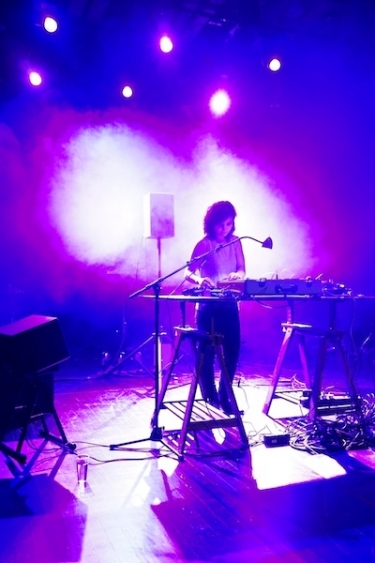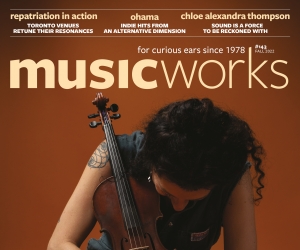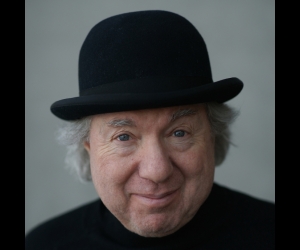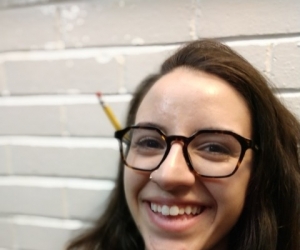
One could say that Sarah Davachi’s drone-based music is all about meditative states, or texture, or duration. But more than anything else, it’s about balance—between the theoretical and the practical, the material and the cerebral, the antique and the avant-garde, the electronic and the purely acoustic. Barons Court (Students of Decay), Davachi’s first vinyl release, is simple and consonant enough that it makes for lovely background music; but listen harder and you’ll discover that its maker is, in fact, something of a deep thinker—as befits someone who did her BA in philosophy before finishing a master’s degree in composition at California’s renowned Mills College in Oakland.
Not that you can really separate the music from the philosophy in Davachi’s work. Her as-yet-unpublished MFA thesis opens with a discussion of phenomenology, as understood by the German philosopher Martin Heidegger. “Works of art, Heidegger said, open up these sorts of worlds,” explains Davachi, who splits her time between Vancouver and Calgary, where she works as content developer with the National Music Centre instrument museum. “I think he means it more generally, in that when you’re introduced to a work of art it opens up this sort of experience that’s multifaceted—there are different sorts of things that come up when you experience it. So in my thesis I sort of kick that around for a little bit, espouse the philosophical stuff first, and then I look at a few different people: La Monte Young, Éliane Radigue, and Iannis Xenakis. I was sort of trying to tie their innovations into their philosophical ideas, which I think really hasn’t been done all that much—and if it has been done, it’s mostly somebody looking at Beethoven or something like that, not really with contemporary experimental music.”
Heidigger’s ideas are easily applied to Barons Court, which is effectively a suite of five compositions that function as linked sonic landscapes, or galleries that one passes through while admiring the beauties they contain. All were assembled in Davachi’s computer, but they use different source materials. The opening track, Heliotrope, for instance, is based on bowed strings, and conveys an almost bucolic sense of peace. By the time the listener arrives at the concluding track, Ruislip, however, the mood darkens and becomes more abstract, with Davachi’s admiration for Young expressed in the sine tones that introduce this completely electronic undertaking. Even so, there are moments in Ruislip where the composer’s work evokes Tuvan harmonic singing. The wild world is never far from Davachi’s consciousness, and one of her musical trademarks is the way that she often suggests a sense of expansive space.
“One of the things I like to do in my music,” she says, “is to exploit psychoacoustic effects, with overtones or beating patterns and things like that, things that aren’t necessarily built in but that the ear perceives due to the acoustics of whatever sound is happening. And so analog synthesizers do that a lot better, just because they’re so unstable. One of the instruments that I’ve used in the past is a Sequential Circuits Pro-One, which is one of my favourite mono synths. It has two oscillators in it, so even if you tune the two oscillators as precisely as you can, after a while, because it’s analog, they’re just going to start to drift a little bit. And so what happens is you get this really slow phasing. That’s just not something that you get with digital instruments, because they’re so much more stable. They tend to stay in tune, which is usually what people want.”
So there’s another dichotomy that Davachi has somehow managed to bridge: the gulf between precision and imprecision. That she’s a perfectionist is obvious—there’s not a note or a drone out of place in Barons Court’s forty-four minutes. But she’s also open to improvisation, at least in performance. “If I’m playing live, it’s not like there’s a specific melody I have to play exactly the same way every time,” she allows. And her music is also confoundingly alive.
“With drone music, people tend to think it’s just like one note held down for twenty minutes,” Davachi says. “Maybe on the surface level that’s what it sounds like, but if you actually pay attention, it’s so much more than that.”
For proof, one need look no further than Davachi’s first full-length release—and the work she’ll no doubt go on to do in the coming years.
Audio: Heliotrope from the album Baron's Court. Find out more about this track.
Photo of Sarah Davachi performing at Sound of Stockholm in 2014: by Heiko Purnhagen.


